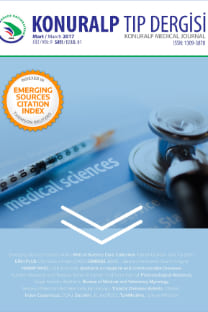Düzce Üniversitesi Tıp Fakültesi 5. ve 6. sınıf Öğrencilerinin Branş Tercihleri ve Tıpta Uzmanlık Sınavı'na Bakışlarının İncelenmesi
Tıpta Uzmanlık Sınavı, Aile Hekimliği, Tıp Öğrencileri
-
-,
___
- Aile Hekimliğinin Kilometre Taşları: Millis ve Willard Raporları. Aktürk Z, Dağdeviren N (Çeviri Editörleri). Türkiye Aile Hekimliği Uzmanlık Derneği Yayınları No:15, İstanbul: Anadolu Ofset, 2004.
- Karaoğlu N. Tıp Eğitiminde Rol Modellik ve Aile Hekimliği için Önemi. TJFMPC 2012;6(2):30-5.
- Türk SağlıkSen 2007. Düzce İli Aile Hekimliği Uygulaması Anketi Raporu. Available at http://www.turksagliksen.org.tr Accessed 21 May 2013.
- 5258 Sayılı Aile Hekimliği Pilot Uygulaması Hakkında Kanun 2004. Kanun Numarası: 5258. Kabul Tarihi: 24.11.2004. Sayı: 25665, Ankara: Resmi Gazete.
- Baltacı D, Kara İH, Bahçebaşı T, Sayın S, Yılmaz A, Çeler A. Düzce İlinde Birinci Basamakta Sağlık Hizmeti Alan Hastaların Aile Hekimi ve Muayenehanesi Hakkındaki Görüşlerinin Belirlenmesi; Pilot Çalışma. Konuralp Tip Dergisi [Konuralp Medical Journal ] 2011;3(2):9-15.
- Wright B, Scott I, Woloschuk W, et al. Career choice of new medical students at three Canadian universities: family medicine versus specialty medicine. CMAJ 2004;170(13):1920-4.
- Choi D, Dickey J, Wessel K, et al. The impact of the implementation of work hour requirements on residents’ career satisfaction, attitudes and emotions. BMC Med Educ 2006;6:53.
- Barzansky B, Etzel SI. Medical schools in the United States, 2006–2007. JAMA 2007; 298(9):1071–7.
- Lambert TW, Goldacre MJ, Turner G. Career choices of United Kingdom medical graduates of 2002: questionnaire survey. Med Educ 2006;40:514–21.
- Lefevre JH, Roupret M, Solen K, et al. Career choices of medical students: a national survey of 1780 students. Med Educ 2010; 44(6):603–12.
- Baxter N, Cohen R, McLeod R. The impact of gender on the choice of surgery as a career. Am J Surg 1996; 172(4):373–6.
- Rosenblatt RA, Andrilla CH. The impact of U.S. medical students’ debt on their choice of primary care careers: An analysis of data from the 2002 medical school graduation questionnaire. Acad Med 2005;80(9):815–9.
- Raphael LI, Jason LA, Ferrari JR. Chronic fatigue syndrome, chronic fatigue, and psychiatric disorders: predictors of functional status in a national nursing sample. J Occup Health Psychol 1999;4(1):63-71.
- Sayın S, Kara IH, Baltaci D, Yilmaz A. Frequency Analysis of Chronic Fatigue and Depression Who Working at the Faculty of Medicine Research Assistants. Konuralp Tip Dergisi [Konuralp Medical Journal] 2013;5(1):11- 7.
- Hauer KE, Durning SJ, Kernan WN, et al. Factors Associated With Medical Students’ Career Choices Regarding Internal Medicine. JAMA 2008;300(10):1154-64.
- Dorsey ER, Jarjoura D, Rutecki GW. The Influence of Controllable Lifestyle and Sex on the Specialty Choices of Graduating U.S. Medical Students, 1996–2003. Academic Medicine 2005;80(9):791-6.
- Emül M, Dalkıran M, Uzunoğlu S, et al. Tıpta Uzmanlık Sınavına Hazırlanan Öğrencilerin Psikiyatri Asistanlığı Hakkındaki Tutumları. Düşünen Adam Psikiyatri ve Nörolojik Bilimler Dergisi 2010;23(4):223-9.
- Seetharaman N, Logaraj M. Why become a Doctor? Exploring the Career Aspirations and Apprehensions amongInterns in South India. Nat J Res Com Med 2012;1(4):178-241.
- Rehman A, Rehman T, Shaikh MA, et al. Pakistani medical students' specialty preference and the influencing factors. J Pak Med Assoc 2011;61(7):713-8.
- Saigal P, Takemura Y, Nishiue T, et al. Factors considered by medical students when formulating their specialty preferences in Japan: findings from a qualitative study. BMC Med Educ 2007;7:31.
- Khader Y, Al-Zoubi D, Amarin Z, et al. Factors affecting medical students in formulating their specialty preferences in Jordan. BMC Med Educ 2008;8:32. doi: 10.1186/1472-6920-8-32.
- Baboolal NS, Hutchinson GA. Factors affecting future choice of specialty among first-year medical students of the University of the West Indies, Trinidad. Med Educ 2007;41:50-6.
- Leduc N, Vanasse A, Scott I, et al. The Career Decision-Making Process of Medical Students and Residents and the Choice of Specialty and Practice Location: How Does Postgraduate Medical Education Fit In? Published by: Members of the FMEC PG consortium, Canada, 2011.
- Eze BI, Okoye OI, Maduka-Okafor FC, et al. Factors influencing choice of medical specialty of preresidency medical graduates in southeastern Nigeria. J Grad Med Educ 2011;3(3):367-71.
- Kutanis RO, Tunç T, Tunç M. Tıpta Uzmanlık Eğiticileri ve Uzmanlık Öğrencileri Tıpta Uzmanlık Sınavı’nı (TUS) Nasıl Algılıyor? Kuram ve Uygulamada Eğitim Bilimleri 2011;11(4):1991-2004.
- Özyıldırım E, Aras A, Yılmaz S, Çalıkoğlu EO, Güraksın A. Atatürk Üniversitesi Tıp Fakültesi Dönem 4., 5. ve 6. Öğrencilerinin Tıpta Uzmanlık Sınavı Hakkındaki Düşünceleri, HASUDER, 15. Ulusal Halk Sağlığı Kongresi, Bursa: Turkey, 2012.
- ISSN: 1309-3878
- Yayın Aralığı: 3
- Başlangıç: 2009
- Yayıncı: Düzce Üniversitesi Tıp Fakültesi Aile Hekimliği AD adına Yrd.Doç.Dr.Cemil Işık Sönmez
Aile Hekimliği Polikliniğinde Multipl Miyelom Olgusu
Alteplase İnfüzyonu ile Tedavi Edilen Protez Mitral Kapak Trombozu Olgusu
Okul Çocuklarında Doktor Tanılı Astım ve Allerjik Hastalıklarla Fast-Food İlişkisi
Kutlu R, Ruhuşen Kutlu, Çivi S., Selma Çivi
Aile Hekimliği Uzmanlığı Dergilerinin Geleceği ve İndeksler: Çözüm Önerileri
İdiyopatik Karpal Tünel Sendromunda Lipid Profili Bozuklukları
Kardiyak Tamponad Kliniği ile Gelen Primeri Belli Olmayan Malignite: Olgu Sunumu
Gaziantep İli İstasyon Aile Sağlığı Merkezi'ne Başvuran Erişkinlerde Obezite Sıklığı
